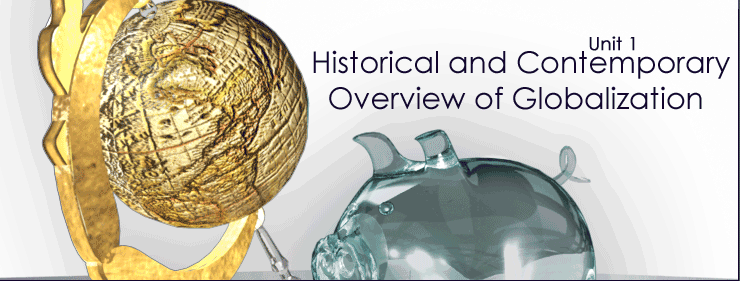Unit 1: Historical and Contemporary
Overview of Globalization
Introduction
Although “globalization”
became the mot du jour to explain changes in the world economy
in the late 1990s, today its meaning is still not very clear.
People associate globalization with increased trade, financial
volatility, business growth, lower commodity prices, cross-cultural
conflict, multinational outsourcing, developing-world poverty
(or progress), environmental degradation, speed-up in all
aspects of life, and terrorism, among other things. Some
of these associations make more immediate sense than others,
but all of them point in one way or another to the integration
of the world economy. This integration has been more pronounced
in the last thirty years than in the previous thirty, but,
as we will see, globalization is actually more the rule
than the exception over the long-historical haul.
Globalization might have little clear meaning because of
its association with freer trade and the fact that Americans
hold notably changeable and somewhat contradictory views
about free trade. A recent poll conducted by Newsweek suggested
that a clear majority of Americans disagreed with the chair
of the President’s Council of Economic Advisers’
claim that outsourcing is good for the American economy.
At the same time, respondents were roughly evenly divided
about whether trade agreements like NAFTA, which enshrine
the principles that enable such outsourcing, were good for
the economy. Likewise, an Investor’s Business Daily/Christian
Science Monitor Poll in 2002 found that a large majority
of Americans believed that the foremost goal of trade policy
should be to increase exports (rather than restrict imports);
at the same time, a similarly large majority said that American
trade policy should include restrictions on imports to protect
American jobs. As far as the theory of international trade
goes, these two views are diametrically opposed. That a
majority of polled Americans could claim to hold them at
the same time perhaps speaks to the work that needs to be
done to clarify the implications of free international trade
and globalization.
WEBSITE: For more polls on the opinions
of Americans on globalization, see The Polling Report’s
international trade website:
Polling Report
http://www.pollingreport.com/trade.htm
So what does globalization
mean? When did it begin?
|
The
topic of globalization can raise intense feelings.
|
| |
|
WEBLINK:
What is globalization? Click here
to find out.


